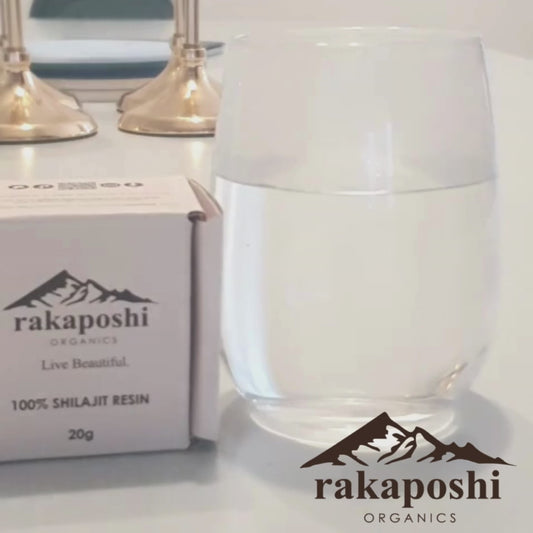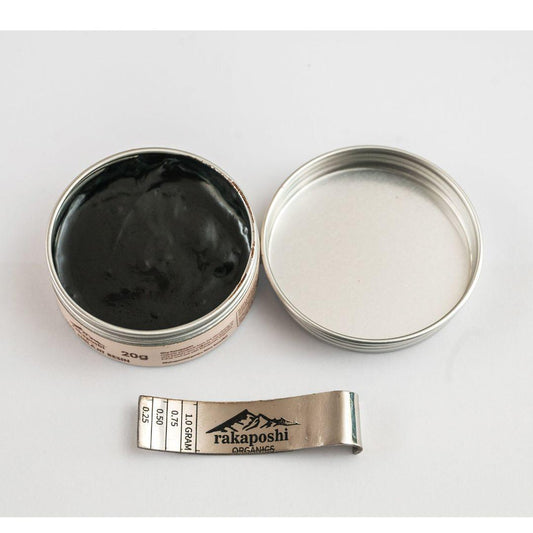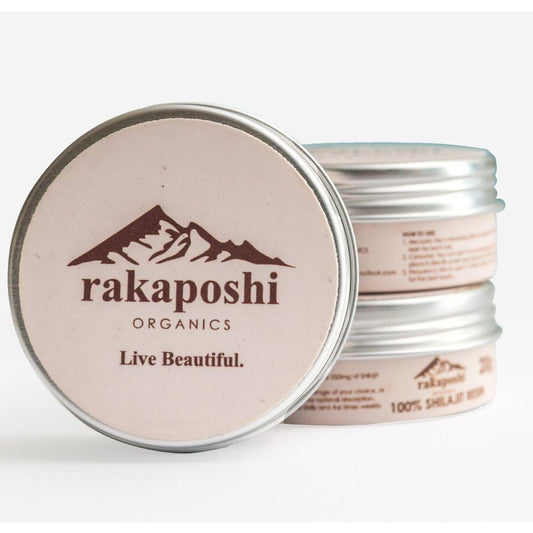
The Resilience Factor: How to Manage Stress and Strengthen Your Body Naturally
Share
The Reality of Modern Stress
Stress is an unavoidable part of modern life. Work deadlines, financial worries, information overload, and even environmental factors like pollution all contribute to the daily pressure we face. The challenge isn't stress itself—it's how our bodies respond to it over time.
When stress becomes chronic, it can affect multiple body systems, contributing to fatigue, inflammation, and various health concerns. However, by adopting a proactive, evidence-based approach, you can build resilience and support your body's natural stress response mechanisms.
In this guide, we'll explore:
- The physiological impact of chronic stress on the body
- Natural strategies for stress resilience, including nutrition, sleep, exercise, and mindfulness
- The role of adaptogens—specifically shilajit—in traditional stress management approaches
- Evidence-based techniques for building mental and physical resilience
The Physiological Impact of Chronic Stress
Stress isn't just a feeling—it's a full-body physiological response triggered by the release of cortisol and adrenaline. While these hormones are necessary for short-term survival (the "fight-or-flight" response), chronic elevation can affect multiple body systems:
1. Immune Function Changes
When cortisol levels remain elevated over extended periods, research shows this can affect immune system function. Chronic stress is associated with increased susceptibility to infections and slower recovery times.
2. Energy and Cognitive Effects
Prolonged stress is associated with depleted energy levels, leading to exhaustion, difficulty concentrating (often called "brain fog"), and reduced motivation. These effects can create a cycle where stress makes it harder to engage in stress-reducing activities.
3. Hormonal Balance
Chronic stress can disrupt the balance of multiple hormones including thyroid hormones, insulin, and reproductive hormones. This disruption is associated with sleep disturbances, changes in weight and metabolism, and mood fluctuations including anxiety.
4. Inflammation Markers
Research has established a clear link between chronic stress and increased inflammation markers in the body. Chronic inflammation is a known risk factor for cardiovascular concerns, cognitive changes, and metabolic issues.
Understanding these mechanisms helps us appreciate why stress management isn't just about feeling better—it's about supporting fundamental physiological processes.
How to Build Stress Resilience Naturally
1. Nourish Your Body with Stress-Supporting Nutrients
Your diet plays a direct role in how your body handles stress. Certain nutrients are involved in cortisol regulation and energy production:
Magnesium (leafy greens, almonds, pumpkin seeds) – Involved in over 300 enzymatic reactions, including those related to stress response and muscle relaxation.
Healthy Fats (avocados, olive oil, wild salmon) – Essential for brain health and involved in reducing inflammatory markers.
B Vitamins (eggs, whole grains, legumes) – Play crucial roles in energy production and nervous system function.
Adaptogenic Herbs (shilajit, ashwagandha, rhodiola) – Traditional substances used in various cultural medicine systems for stress adaptation.
Shilajit's Traditional Use in Stress Management
In Ayurvedic traditional medicine, shilajit has been used for centuries as part of stress management approaches. It contains fulvic acid and over 80 trace minerals naturally present in its geological formation. Some research has examined shilajit's relationship to cellular energy production and oxidative stress markers, though more studies are needed to fully understand these mechanisms.
Traditional practitioners valued shilajit as part of comprehensive wellness approaches that included diet, lifestyle practices, and stress management techniques.
2. Optimize Sleep for Recovery and Stress Reduction
The relationship between sleep and stress is bidirectional: poor sleep increases cortisol levels, and high stress disrupts sleep quality. This creates a cycle that can be difficult to break without intentional intervention.
The 3 Pillars of Restorative Sleep
✅ Schedule Consistency: Going to bed and waking at the same time daily helps regulate your circadian rhythm, which influences cortisol patterns and overall stress response.
✅ Sleep Environment: Keep your bedroom cool (65-68°F), dark, and free of electronic distractions. Blue light from screens suppresses melatonin production, making it harder to fall asleep.
✅ Sleep-Supporting Practices: Magnesium-rich foods, herbal teas (chamomile, valerian root), and traditional adaptogens have been used in various cultures to promote relaxation before sleep.
Traditional Use of Shilajit for Sleep
Some traditional practices include shilajit as part of evening routines. While research on shilajit and sleep is limited, some studies have examined its effects on oxidative stress and cellular energy metabolism, which may be relevant to recovery processes that occur during sleep. Individual experiences vary, and more research is needed in this area.
3. Exercise: An Evidence-Based Stress Management Tool
Regular physical activity is one of the most well-researched interventions for stress management. Exercise helps metabolize excess cortisol while increasing endorphins, the brain's natural mood-regulating compounds.
Best Exercise Approaches for Stress Reduction
Low-Impact Movement (walking, yoga, tai chi) – Research shows these activities can lower cortisol levels and activate the parasympathetic nervous system, promoting relaxation.
Resistance Training (weightlifting, bodyweight exercises) – Builds both physical and mental resilience. The discipline required for progressive training translates to improved stress coping mechanisms.
High-Intensity Interval Training (HIIT) – Efficiently metabolizes stress hormones and increases dopamine levels, though it's important to balance intensity with adequate recovery.
Exercise Recovery and Mineral Replenishment
Intense exercise depletes minerals through sweat and metabolic processes. Replacing these minerals through diet is important for recovery. Shilajit contains over 80 trace minerals in their naturally occurring forms, which is why some athletes incorporate it into their recovery routines. However, a mineral-rich whole-food diet remains the foundation of proper nutrition.
4. Strengthen Mental Resilience with Mindfulness Practices
Building mental resilience is equally important as physical stress management. These evidence-based practices can help regulate your stress response:
Mindfulness Techniques for Stress Regulation
✅ Meditation & Deep Breathing – Extensive research shows these practices lower blood pressure, reduce cortisol levels, and improve emotional regulation. Even 10 minutes daily can produce measurable benefits.
✅ Journaling & Gratitude Practices – Studies show that regular gratitude journaling can rewire neural pathways, shifting focus from stress triggers to positive aspects of life.
✅ Time in Nature – Nature exposure has been shown to regulate the nervous system, lower cortisol, and reduce rumination (repetitive negative thinking).
Cognitive Support in Traditional Medicine
In Ayurvedic tradition, shilajit has been valued for its role in mental clarity and cognitive function. Some research has examined compounds in shilajit and their relationship to brain inflammation markers and neurotransmitter regulation, though this research is still emerging. Traditional use emphasized shilajit as part of holistic approaches that included meditation, dietary practices, and lifestyle modifications.
Advanced Strategies for Stress Mastery
1. Nervous System Regulation Techniques
Cold Exposure: Cold showers or ice baths stimulate the vagus nerve, which plays a key role in the parasympathetic (rest-and-digest) nervous system. Research shows cold exposure can improve stress resilience over time.
Breathwork: Box breathing (inhale 4 counts, hold 4, exhale 4, hold 4) activates the parasympathetic nervous system, lowering heart rate and promoting calm. This technique is used by military personnel and athletes for stress management.
2. Adaptogenic Herbs in Traditional Medicine
Adaptogens are a category of herbs traditionally used to help the body adapt to stress. While the term "adaptogen" comes from Soviet research in the 1940s, many of these plants have been used in traditional medicine for centuries.
Traditional Adaptogens for Stress
Shilajit – Used in Ayurvedic medicine for thousands of years. Contains minerals and organic compounds formed through geological processes. Some research has examined its effects on cellular energy and oxidative stress markers.
Rhodiola Rosea – Traditional Scandinavian and Russian herb. Research has examined its relationship to fatigue and stress adaptation.
Ashwagandha – Ayurvedic herb with extensive research on cortisol levels and stress markers. Multiple studies show it can reduce cortisol and anxiety scores.
Important Context: While these herbs have traditional use and some research support, they work best as part of comprehensive stress management that includes sleep, nutrition, exercise, and mindfulness practices. They are not standalone solutions.
Creating Your Stress Resilience Plan
Building stress resilience requires a multi-faceted approach. Here's how to integrate these strategies:
Daily Stress Management Routine
Morning:
- 10 minutes of meditation or breathwork
- Nutrient-dense breakfast with protein and healthy fats
- Optional: Shilajit dissolved in warm water (300-500mg)
Throughout the Day:
- Regular movement breaks (walk, stretch)
- Mindful eating without screens
- Hydration with mineral-rich water
Evening:
- Light exercise or yoga
- Screen-free time 1-2 hours before bed
- Magnesium-rich foods or supplements
- Consistent sleep schedule
Weekly:
- 3-4 resistance training sessions
- 1-2 nature walks or outdoor activities
- Journaling or gratitude practice
- Social connection with supportive people
Where Adaptogens Fit
Traditional adaptogens like shilajit can be incorporated as one component of this comprehensive approach. Following traditional practices, 300-500mg of shilajit resin dissolved in warm water can be consumed daily, typically in the morning or before stressful activities.
Important: Adaptogens are not replacements for fundamental stress management practices (sleep, nutrition, exercise, mindfulness). They are complementary tools that may support your overall approach. Individual responses vary, and consultation with a healthcare provider is recommended, especially if you have medical conditions or take medications.
Make Stress Resilience a Daily Practice
Stress is inevitable in modern life, but chronic stress and its negative effects are not. By incorporating evidence-based strategies—stress-supporting nutrition, sleep optimization, regular exercise, mindfulness practices, and traditional adaptogens like shilajit—you can build long-term resilience.
The key is consistency and a holistic approach. No single intervention will eliminate stress, but combining multiple strategies creates a robust foundation for managing life's pressures while maintaining energy, mental clarity, and overall well-being.
Taking small, intentional steps to manage stress leads to compounding benefits over time. Instead of feeling constantly drained, you can develop the resilience to handle challenges while maintaining vitality and focus.
Frequently Asked Questions
How does chronic stress actually affect the body?
Chronic stress elevates cortisol and adrenaline over extended periods, which research shows can affect immune function, disrupt hormonal balance, increase inflammation markers, interfere with sleep quality, and deplete energy levels. These are physiological responses, not just psychological feelings.
What are the most effective stress management strategies?
Research consistently shows that sleep optimization (7-9 hours), regular exercise (especially resistance training and walking), mindfulness practices (meditation, breathwork), stress-supporting nutrition (adequate protein, healthy fats, magnesium), and social connection are the most effective approaches. Combining multiple strategies is more effective than relying on any single intervention.
How do adaptogens work for stress?
Adaptogens are herbs traditionally used to help the body adapt to stress. Research suggests they may work by modulating the hypothalamic-pituitary-adrenal (HPA) axis, which regulates cortisol production. However, mechanisms are still being studied, and effects vary by individual and specific adaptogen.
Can shilajit help with stress management?
Shilajit has been used in Ayurvedic tradition for stress-related concerns for thousands of years. Some research has examined its effects on cellular energy production and oxidative stress markers. However, it should be viewed as one component of a comprehensive stress management approach, not a standalone solution. More research is needed to fully understand its mechanisms.
How long does it take to build stress resilience?
Building genuine stress resilience is a gradual process. Some interventions (like breathwork or meditation) can produce immediate calming effects, but lasting resilience typically develops over weeks to months of consistent practice. Research on mindfulness meditation, for example, shows measurable brain changes after 8 weeks of regular practice.
Can I take shilajit with other adaptogens?
Shilajit can often be combined with other adaptogens like ashwagandha or rhodiola, and some traditional formulations include multiple herbs. However, consult a healthcare provider about compatibility, especially if you take medications or have specific health conditions.
What's more important—supplements or lifestyle changes?
Lifestyle factors (sleep, exercise, nutrition, stress management) are the foundation and should always be prioritized. Supplements, including adaptogens, can complement these fundamentals but cannot replace them. Research consistently shows that lifestyle interventions have the most significant and lasting effects on stress resilience.
The Path to Lasting Resilience
Stress resilience isn't about eliminating stress—it's about building your capacity to handle it effectively. By combining evidence-based lifestyle practices with traditional wisdom, you create a comprehensive approach that supports both immediate stress relief and long-term adaptation.
The strategies outlined here—from sleep optimization to mindfulness practices to traditional adaptogens like shilajit—represent tools you can use to build a personalized stress management system. Start with the fundamentals (sleep, nutrition, movement), then layer in additional practices that resonate with you.
Remember: resilience is built through consistent, small actions over time, not through quick fixes or single solutions. Your body has remarkable adaptive capacity when given the right support.
Discover authentic Rakaposhi Gold Shilajit—sourced from the Karakoram range, processed using traditional Aftabi methods, independently lab-tested for purity and safety, and supporting fair trade practices in Gilgit-Baltistan. Experience a traditional approach to stress resilience and vitality.



